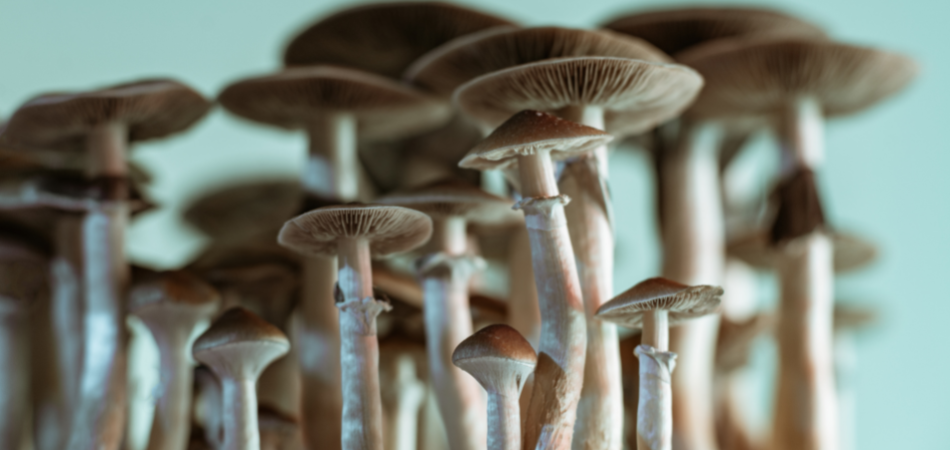Psilocybin addiction
Psilocybin, widely known as magic mushrooms or shrooms, is a hallucinogenic substance categorised as a class A drug in the UK. This carries punishments of up to seven years in prison or an unlimited fine if caught in possession. As well as the potential legal implications, psilocybin poses a danger to your health and well-being. Psilocybin addiction is unfortunately a very real problem in the UK but often goes under the radar due to growing social acceptance of the drug.
If you or someone you know is suffering from addiction, Liberty House offers inpatient rehab that can help you to get back on your feet and start a whole new life, free from the clutches of psilocybin dependence.
What is psilocybin?
Magic mushrooms are naturally occurring, psychedelic drugs containing the psychoactive compound psilocybin. They are typically eaten either in fresh or dried form, brewed into tea or baked into foods. Their history dates back to ancient times when they were used in spiritual and religious rituals and were believed to enable users to communicate with the gods. In the 1960s, the recreational use of psilocybin soared in popularity and is still commonplace today.
Once consumed, effects may take thirty minutes or more to appear and can last up to five hours. The potency of psilocybin is unpredictable and can depend on a number of factors, including the type of mushrooms, their freshness, the season and the location where they are grown. This makes it difficult to know the strength or type of high that will occur.
How does psilocybin addiction develop?
Psilocybin works by interacting with your brain receptors, essentially reducing neural activity and disrupting brain processes. This produces the side effects that are well-known with magic mushroom use, including changes in perception and visual and auditory hallucinations.
Psilocybin addiction is not defined by a physical dependence, rather it is a psychological addiction. This means that you may seek out and use magic mushrooms to attain the pleasurable feelings associated with this drug, chase previous highs or attempt to replicate exciting trips. You may also believe that you need to continually use magic mushrooms to achieve a sense of enlightenment or to maintain your own happiness.
Psilocybin addiction usually begins with curiosity and experimentation, followed by regular consumption. Tolerance develops rapidly with psilocybin use and you will find that you need continually higher doses of psilocybin to achieve the same effects. This can contribute towards the further abuse of hallucinogens and other substances as you try to achieve a desired high.
You may be addicted to psilocybin if:
- You spend significant amounts of time obtaining and consuming psilocybin
- You use psilocybin as a way to cope with negative emotions or as a way to escape reality
- You continue to take psilocybin despite the negative consequences or in situations where it is unsafe
- You have experienced mental health issues as a result of your psilocybin use
- You mix psilocybin with other drugs or alcohol
If you believe that you are suffering from psilocybin addiction, reach out to our team at Liberty House and start your recovery journey. Don’t wait for this condition to progress – a healthier and more productive life is just around the corner.
The risks of psilocybin
As with any drug addiction, there are a number of negative ramifications involved with psilocybin abuse and these can cause both physical and mental harm. Some of the risks include:
- Anxiety, panic attacks and episodes of paranoia or psychosis
- Inability to determine what is real and what is not
- Unpleasant or distressing hallucinations
- Loss of coordination or inability to move
- Speech difficulties
- Stomach pains, nausea, vomiting or diarrhoea
- High blood pressure and increased heart rate and temperature
- Increased likelihood of engaging in dangerous or reckless behaviour which can lead to injury or even death
- Risk of ingesting a poisonous mushroom that has been mistaken for a hallucinogenic mushroom
As you ‘comedown’ from your psilocybin high, you may also experience fatigue, headaches, or depression. In severe cases, you may continue to experience hallucinations or ‘flashbacks’ long after the effects of psilocybin have worn off. This is known as Hallucinogen Persisting Perception Disorder (HPPD) and can occur for weeks, months and even years after you have taken the drug.
Spotting psilocybin addiction in a loved one
If you are worried about a loved one and suspect they are abusing or addicted to psilocybin, there are some key signs to look out for. These include:
- Exhibiting bizarre behaviour, for example, seeing things that aren’t really there, becoming fixated on inanimate objects or laughing uncontrollably
- Becoming more secretive or isolated as they attempt to hide their psilocybin use
- Displaying difficulties at work or school, for example, they may often arrive late or be unable to focus because of their psilocybin use
- Decreased energy – they may appear fatigued as they ‘comedown’ from psilocybin
- They may have trouble living in reality and might need psilocybin to maintain an altered state of mind
If someone you know is clinging to psilocybin, becoming detached from reality and fixating on their next dose, they could be suffering from psilocybin addiction. In this case, it is vital that you encourage them to get the help they need. Make sure you approach them in a kind and supportive way, remain free from judgement and try to understand why they are turning to psilocybin. Your love and concern for their well-being could be the prompt they need to overcome psilocybin addiction.
Psilocybin detox and withdrawal
Unlike other drug addictions, psilocybin addiction does not produce physical withdrawal symptoms and detoxing from this drug is therefore relatively straightforward. If you have a psychological dependence to psilocybin, you may experience:
- Depression and anxiety
- Exhaustion
- Difficulty separating hallucinations from reality
- Cravings for psilocybin
If you regularly take psilocybin alongside other substances, however, it is possible that the detox and withdrawal period will be more intense. In this case, withdrawal symptoms can range from mild to severe and could last anywhere between a few days to a few weeks. This depends on the type of substance used, the amounts consumed, the frequency in which it is taken, as well as your overall health.
It is important to take part in an assisted psilocybin detox at a reputable addiction facility where medical staff can monitor your condition and support you every step of the way, ensuring you remain comfortable and safe throughout.
Psilocybin rehab
As psilocybin addiction is largely psychological, healing from this condition requires therapy and counselling. Without addressing the underlying causes of your psilocybin addiction, it is unlikely that your recovery will be successful long-term.
Some of the addiction therapies provided at Liberty House include:
- Dialectical behaviour therapy (DBT): a type of cognitive behavioural therapy that focuses on accepting difficult emotions, teaching you how to manage them without turning to psilocybin.
- Group therapy: a highly beneficial therapy that allows you to connect with a group of peers and discuss your psilocybin addiction in a supportive and safe setting.
- Mindfulness-based therapies: mindfulness therapies aim to shift your mind to the present moment using techniques that help you avoid falling back into old patterns of psilocybin abuse.
- Relapse prevention: this helps you to develop coping strategies and devise a plan to avoid relapsing as you recover from psilocybin addiction.
- Yoga and meditation: yoga therapy and meditation have proven extremely helpful both during psilocybin addiction rehab and as you continue your ongoing recovery outside of our doors.
As everyone experiences psilocybin addiction and recovery differently, Liberty House offers a wide range of therapies and holistic activities that target physical, emotional and spiritual healing. By keeping an open mind and trying all of our treatment services, you are more likely to find the therapy methods that best suit you.
The benefits of psilocybin rehab
Rehab treatment can be an extremely beneficial experience for those struggling with psilocybin addiction. The physical and psychological benefits of rehab can be life-changing. Some of these benefits include:
- Improved physical and mental health
- Reduced drug cravings
- Increased self-esteem and self-confidence
- Better coping skills
- Improved communication skills
- Stronger relationships
Rehab is an important step in recovering from psilocybin addiction. It can provide you with the tools you need to live without drugs and prevent your addiction from spiralling out of control. Ultimately, psilocybin rehab will provide you with new opportunities, opening doors to a life that you never thought was possible.
If you are ready and willing to take the next step and begin recovering from psilocybin addiction, contact our admissions team today.









